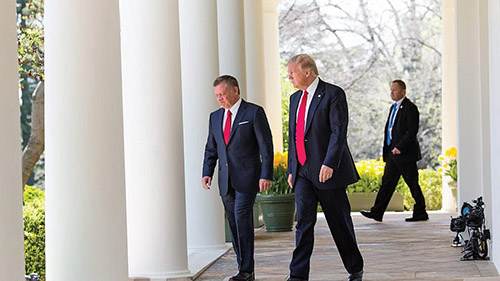
In recent months, US presidential advisers Jared Kushner and Jason Greenblatt have increased their contacts with elements in the region, including the United Arab Emirates, Oman, Bahrain, Qatar, Saudi Arabia and Turkey, towards the goal of finalizing the plan for Israeli-Palestinian peace known as the “deal of the century.” Jordanian King Abdullah II has made several visits to the United States lately, during which he was reportedly advised about the details of the plan and consulted on his country’s possible role in it. Ahead of the public announcement of the plan, expected to take place soon, there has been considerable apprehension about it in Jordan.
This is due to leaks published in the Arab, Israeli and international media, according to which Jordan will be expected to take part in resolving the Palestinian problem in ways that could change its character and demography, such as naturalizing Palestinian refugees, forming a confederacy with the Palestinian Authority or becoming an alternative homeland for the Palestinian people. For example, the Lebanese Al-Akhbar daily reported on April 5 that as part of the deal, Jordan will be expected to naturalize about one million Palestinians in return for $45 billion.
The daily speculated further that a confederation of Jordan, the Palestinian Authority and Israel’s Civil Administration in the West Bank is likely to be established; that all of Jerusalem will be annexed to Israel; and that the Israeli settlements will remain under Israeli rule. In addition, the Israeli media reported that the deal could include changing Jordan’s special status in Jerusalem by granting a role in the city to additional countries, such as Saudi Arabia and Morocco.
This is another cause for concern in Jordan, which has led Jordanian officials to make hardline statements on the topic of Jerusalem in recent weeks. The concerns about the deal are also reflected in articles by senior Jordanian journalists, who have presented it as a “conspiracy,” an “existential threat” to the kingdom and as an attempt to eliminate the Palestinian problem at Jordan’s expense. King Abdullah himself made firm statements on the issue, clarifying that he would by no means succumb to the pressures being exerted on him.
Remarks made by King Abdullah were reported by the Palestinian daily Al-Quds, according to which the king had stressed that “Jordan’s position on attaining peace has not changed: [peace] must be based on the international resolutions, and on two states existing side by side in peace and security: Israel and Palestine on the June 4, 1967 borders with East Jerusalem as its capital, and on a just solution to the problem of the Palestinian refugees.”
By Z. Harel/MEMRI/JNS.org











